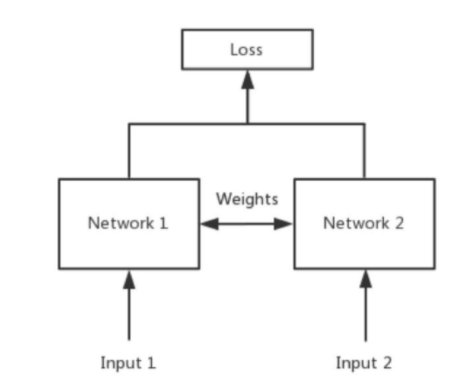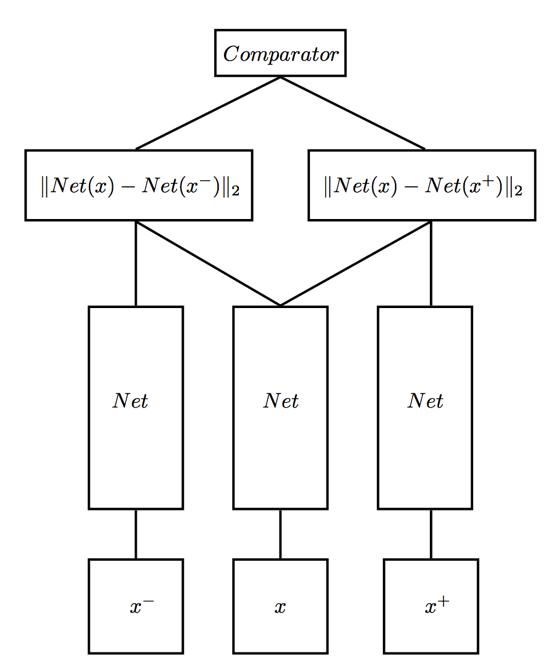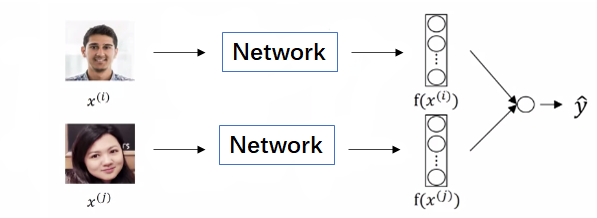Siamese Network介绍
2021-01-07 01:28
标签:很多 triple 样本 loading 共享 str neu put eal Siamese Network主要用于衡量两个输入的相似程度,如下图所示,Network 1和Network 2是共享权值的相同神经网络,这个网络将两个输入映射到新的特征空间中,通过设计好的与距离有关的损失函数来训练网络参数,使得训练好的网络可以衡量两个输入的相似程度。 1. Triplet Loss. 以人脸识别为例,训练过程中的模型架构如下图所示: 网络训练好之后,使用Siamese Network进行两个输入相似程度的判断。仍以人脸识别为例,对输入的两张人脸图片$x_1$和$x_2$计算距离$d(x_1,x_2)=\|Net(x_1)-Net(x_2)\|_2$,若距离小于预先给定的临界值threshold,则判断为同一人,否则为不同的人,如下图所示: 2. Binary Classification Loss. 如下图所示,在训练过程中每次输入两张图片$(x^{(i)},x^{(j)})$,从网络输出$f(x^{(i)}),f(x^{(j)})$后计算为同一人的概率$\hat{y}$: 参考资料 Siamese Network介绍 标签:很多 triple 样本 loading 共享 str neu put eal 原文地址:https://www.cnblogs.com/sunwq06/p/13575887.html Siamese Network经常用于要分类的类别很多或者不确定,但每个类别的样本比较少的情况,例如人脸识别。针对Siamese Network的训练可以设计多种不同的损失函数,本文介绍以下两种:
Siamese Network经常用于要分类的类别很多或者不确定,但每个类别的样本比较少的情况,例如人脸识别。针对Siamese Network的训练可以设计多种不同的损失函数,本文介绍以下两种: 在训练过程中每次同时输入三张人脸图片$(x, x^+, x^-)$,其中$x$和$x^+$为同一人,$x$和$x^-$为不同的人,损失函数的设计原理是使得网络输出$Net(x)$和$Net(x^+)$的距离很小,而$Net(x)$和$Net(x^-)$很大,Triplet Loss的形式可表示为:$$L(x, x^+, x^-) = \max \left(\|Net(x)-Net(x^+)\|_2^{2}-\|Net(x)-Net(x^-)\|_2^{2}+\alpha, 0\right)$$其中$\alpha$为一个预先给定的正值。
在训练过程中每次同时输入三张人脸图片$(x, x^+, x^-)$,其中$x$和$x^+$为同一人,$x$和$x^-$为不同的人,损失函数的设计原理是使得网络输出$Net(x)$和$Net(x^+)$的距离很小,而$Net(x)$和$Net(x^-)$很大,Triplet Loss的形式可表示为:$$L(x, x^+, x^-) = \max \left(\|Net(x)-Net(x^+)\|_2^{2}-\|Net(x)-Net(x^-)\|_2^{2}+\alpha, 0\right)$$其中$\alpha$为一个预先给定的正值。

def triplet_loss(y_pred, alpha = 0.2):
"""
Arguments:
y_pred -- python list containing three objects:
anchor -- the network output for the anchor images x, of shape (None, output_size)
positive -- the network output for the positive images x+, of shape (None, output_size)
negative -- the network output for the negative images x-, of shape (None, output_size)
Returns:
loss -- real number, value of the loss
"""
anchor, positive, negative = y_pred[0], y_pred[1], y_pred[2]
# Compute the (encoding) distance between the anchor and the positive
pos_dist = tf.reduce_sum(tf.square(tf.subtract(anchor, positive)), -1)
# Compute the (encoding) distance between the anchor and the negative
neg_dist = tf.reduce_sum(tf.square(tf.subtract(anchor, negative)), -1)
# Subtract the two previous distances and add alpha.
basic_loss = tf.add(tf.subtract(pos_dist,neg_dist), alpha)
# Take the maximum of basic_loss and 0.0. Average over the training batch.
loss = tf.reduce_mean(tf.maximum(basic_loss, 0.0), axis=None)
return loss

 $$\hat{y}=sigmoid\left(\sum_{k=1}^{output{\_size}} w_{k}\left|f\left(x^{(i)}\right)_{k}-f\left(x^{(j)}\right)_{k}\right|+b\right)$$若两张为同一人,则真实标签$y$为1,否则为0,使用Logistic回归中的交叉熵损失函数,即$$L(x^{(i)},x^{(j)})=L(\hat{y},y)=-y\ln\hat{y}-(1-y)\ln{(1-\hat{y})}$$训练结束后对输入的两张图片计算$\hat{y}$即可判断是否为同一人。
$$\hat{y}=sigmoid\left(\sum_{k=1}^{output{\_size}} w_{k}\left|f\left(x^{(i)}\right)_{k}-f\left(x^{(j)}\right)_{k}\right|+b\right)$$若两张为同一人,则真实标签$y$为1,否则为0,使用Logistic回归中的交叉熵损失函数,即$$L(x^{(i)},x^{(j)})=L(\hat{y},y)=-y\ln\hat{y}-(1-y)\ln{(1-\hat{y})}$$训练结束后对输入的两张图片计算$\hat{y}$即可判断是否为同一人。